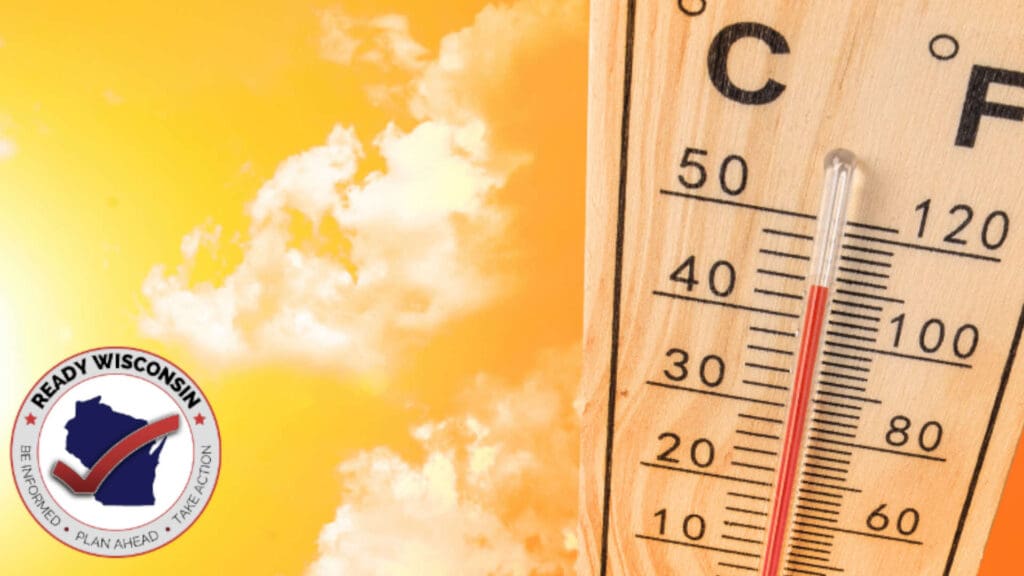
MADISON, Wis – As the state begins to warm up, Wisconsinites should pay closer attention to the health and well-being of themselves and loved ones throughout the warmer months. To encourage everyone to take steps to prevent heat-related illnesses or deaths, Gov. Tony Evers declares June 4 as Heat Awareness Day in Wisconsin.
“While increased temperatures can have negative impacts on our health, heat-related illnesses and deaths are preventable,” said Wisconsin Emergency Management Administrator Greg Engle. “It’s important to stay alert to weather conditions and take the steps necessary to keep yourself, your families and pets safe throughout these upcoming warmer months.”
High temperatures, especially when combined with humidity, can quickly cause heat-related illnesses, such as heat exhaustion or heat stroke. The National Weather Service (NWS) issues advisories for high heat to help warn people of these potential dangers.
“Extreme heat is weather that shouldn’t be messed with,” said NWS Milwaukee Warning Coordination Meteorologist Tim Halbach. “We’re able to see these long duration heat waves well in advance of them occurring, so if you’re hearing about a potential heat wave in the next week, start taking proactive measures to stay safe before the heat hits.”
People of all ages are at risk of getting heat-related illnesses. In 2024, two heat-related deaths occurred in Wisconsin, according to preliminary data from the Wisconsin Department of Health Services (DHS). More than 668 Wisconsinites also visited emergency rooms for heat-related illnesses last year.
“Wisconsin recorded its hottest year on record last year, surpassing the year of heat waves in 2012,” said State Health Officer and DHS Division of Public Health Administrator Paula Tran. “Climate change is turning up the heat and we’re getting hit with more dangerously hot and humid days that can make us sick.”
During periods of intense heat, DHS urges people to watch for early signs of heat illnesses like dizziness, headaches, fatigue, and muscle cramps — whether they’re at home, working outdoors or participating in outdoor activities.
While extreme heat can put everyone at risk of heat illnesses, the heat health risks are greatest for infants and children, older adults, people who are pregnant, people who work or exercise in the heat, people without a home, and people with chronic conditions such as breathing difficulties, heart conditions, mental health conditions, diabetes, kidney diseases, or obesity.
ReadyWisconsin and DHS recommend following these tips to beat the heat and stay safe during heat waves:
- Remain inside air-conditioned buildings as much as possible during the hottest parts of the day. Call 2-1-1 to find an accessible cool place near you.
- If you don’t have air conditioning or a basement, take a cool shower, soak your feet or arms in cold water, or place a cool, wet cloth on your forehead. Keep your windows covered to avoid direct sunlight.
- Drink plenty of fluids and avoid alcoholic, caffeinated or high-sugar drinks. Don’t wait until you’re thirsty to drink.
- Never leave a child or pet unattended inside a parked car. After just 20 minutes on an 80-degree day, the CDC says the inside of a car can hit 109 degrees Fahrenheit.
- Seek medical attention right away if you develop heat stroke symptoms such as confusion, rapid breathing and heartbeat, body temperature above 104°F, or nausea and vomiting.
- Check in with loved ones and neighbors during heat waves, especially if they last a few days. Check for signs of heat illness and make sure they are cool and hydrated.
- Limit your pet’s time outdoors and make sure they have access to fresh drinking water. If the pavement is too hot for your hands, it is too hot for their paws.
During periods of intense heat, each NWS Forecast Office uses multiple tools to assess the potential for heat-related health issues. One of those tools is the Heat Index which measures how hot it really feels when relative humidity is factored in with the actual air temperature. The NWS uses these tools to issue the following heat-related alerts as conditions warrant.
- Extreme Heat Warning: An extreme heat warning is issued when the maximum heat index temperature is expected to be 105°F or higher and not to go below 75°F for a Heat Index the morning prior or after. Check in with loved ones and neighbors during heat waves, especially if they last a few days. If the maximum heat index will be between 100-104°F for four days in a row, a warning will be issued.
- Extreme Heat Watches: Heat watches are issued when conditions are favorable for an extreme heat event within the next one to three days.
- Heat Advisory: A heat advisory is issued when the heat index temperature is expected to be 100°F or higher. If the maximum heat index will be between 95-99°F for four days in a row, then an advisory will also be issued.
- Outlooks: The outlooks are issued when the potential exists for an excessive heat event in the next three to seven days.
Find more tips on preparing for heat waves at https://readywisconsin.wi.gov/extreme-heat/ or preventing heat-related illnesses at https://www.dhs.wisconsin.gov/climate/weather/heatillness.htm.
Learn more about heat safety information and forecast tools at https://www.weather.gov/safety/heat or https://ephtracking.cdc.gov/Applications/HeatRisk/.
To view Governor Evers’ proclamation, visit https://evers.wi.gov/Pages/Newsroom/Proclamations.aspx
For more tips on emergency preparedness, head to http://readywisconsin.wi.gov. You can also follow ReadyWisconsin on Facebook, X, and Instagram.

